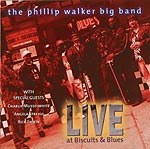
Walker still tears up on guitar
|
This review first appeared in the Summer 2003 issue of Turbula.
Phillip Walker's been around since the '50s, but it was in the late 1980s that he reached his greatest public visibility so far, cutting a series of albums for Rounder and HighTone – and having some of his earlier recordings re-issued during the blues boom of the '80s when they found a greater audience than they had in the '70s.
The thing that's always set Walker apart is having feet in two very distinct blues camps – he can play as much guitar as anyone, hanging tough with the Johnny Copeland and Albert Collins crowd, and yet he's also as smooth a blues singer as ever crooned a broken-hearted tale.
In this ability to span the whole of the blues, the gritty and the elegant, Walker is in pretty rare company – the late T-Bone Walker and Clarence "Gatemouth" Brown come to mind, but it's damn hard to think of anyone else.
T-Bone and Gatemouth were equally at home in a cutting session or a high-falutin' ballroom with a big band – as is Phillip Walker. In fact, he's probably a bit more inclined than either of those two giants to turn a big band dance into a raw-edged blues set.
In 2001, he took his big band and a few guest musicians to the Biscuits & Blues club in SanFran and did just that. Tearing through staples from his own repertoire (classics like his own "Hello My Darling" and "Don't Be Afraid of the Dark," which Robert Cray made into a minor hit when both were with HighTone), and mixing in covers like Lowel Fulsom's "Reconsider Baby" and a duet with Angela Strehli on "Think," Walker shows that he's lost not a lick on guitar and that he can still lead as tight a band as exists.
What keeps this album from being a classic is the thin quality of Walker's voice. Don't know whether it's age (he's 66 now) or just a bad night, but the singing on this set doesn't have the usual strength of a Phillip Walker session.
Not enough to remove any of the pleasure of hearing him play that guitar, but nor can it be held up as among his best work.
